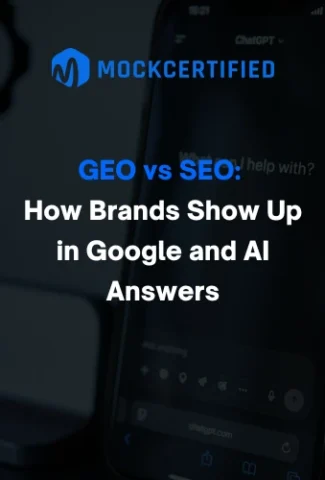
Here’s a question that might sound odd at first: If you rank #1 on Google but nobody mentions your content in ChatGPT, did you really get found? Welcome to the confusion facing certification prep platforms in 2025. The search landscape has changed dramatically. Traditional ranking no longer guarantees visibility.
For platforms like MockCertified.com, which specializes in PMP and IT certification mock tests powered by Alexa and the AI study partner Mockbuddy, understanding GEO vs SEO isn’t just an option. It’s survival.
Let’s explore why this distinction matters for your certification journey and how it shapes the future of online learning.
SEO: The Old Guard of Digital Visibility
For almost three decades, SEO has been the foundation of online discovery. When you search for “PMP mock exams” on Google, the results you see are there because of SEO. These websites are optimized for keywords, built quality backlinks, and structured their technical code to please Google’s algorithm.
Traditional SEO works by focusing on factors like keyword density, site structure, meta descriptions, and backlinks. A certification platform that invests in strong SEO might rank on page one of Google searches related to “practice tests for IT certifications.” The benefits are real and measurable.
An estimated 71.5% of users still use traditional search before clicking on any website. So ignoring SEO completely would be foolish for any platform serious about student recruitment. The competition for those clicks remains fierce.
However, here’s where the problem begins. SEO optimization is designed to rank websites, not to get mentioned inside AI-generated answers. When a student asks ChatGPT “What’s the best way to prepare for PMP?” the search engine algorithm doesn’t dictate the response. A large language model does.
And that model operates by completely different rules. The distinction between how Google ranks pages and how ChatGPT decides what to cite is fundamental to understanding where digital marketing is headed.
The Rise of GEO: The New Player in How Information Spreads
GEO (Generative Engine Optimization) vs SEO represents a fundamental shift in how information reaches users in 2025 and beyond. GEO focuses on making your content worthy of being cited in AI-generated answers. ChatGPT has over 300 million weekly users and processes more than 1 billion daily queries.
When these systems generate answers, they synthesize information from multiple sources and decide which sources deserve a mention. This is radically different from traditional search engine behavior. Google indexes pages based on crawlability and ranking signals. ChatGPT reads and remembers vast amounts of training data, then generates responses based on what it learned.

The evolving world of search — where SEO meets GEO for smarter brand visibility.
The key difference between GEO vs SEO is profound. SEO says: “Make your site rankable.” GEO says: “Make your content citable.” This distinction changes everything about how you write, structure, and present information. It’s not just a minor tweak; it’s a wholesale rethinking of content strategy.
When you optimize for GEO, you’re not playing for the top position on a search results page. You’re playing to be quoted, directly, by AI systems that millions of people trust.
The Technical Differences
The mechanics of how GEO vs SEO operate are worth examining more closely. Traditional SEO relies on Google’s crawler bot visiting your website, reading your HTML code, and analyzing hundreds of ranking factors. Page speed matters. Mobile responsiveness matters. Backlink quality matters. All of these factors get fed into algorithms that determine ranking position.
GEO optimization, by contrast, focuses on whether AI training systems incorporated your content and whether language models can extract and cite it accurately. This requires different thinking. Your content needs to be clear, directly answer questions, and provide verifiable information that an AI system can reference with confidence.
| Aspect | SEO | GEO |
|---|---|---|
| Goal | Rank pages on Google | Get cited by AI platforms like ChatGPT |
| Optimization Focus | Keywords, backlinks, structure | Clarity, structure, factual integrity |
| Performance Metric | Clicks and rankings | Mentions and citations |
GEO vs SEO in the Context of Certification Prep Platforms
For MockCertified, understanding GEO vs SEO has immediate, practical consequences. The platform offers PMP mock exams, IT certification tests, and features an Alexa-powered interface. Most importantly, it includes Mockbuddy, an AI study partner that generates custom MCQs when students type in topics.
Traditional SEO would suggest optimizing blog posts with keywords like “PMP mock exams” and building backlinks from authority websites. This strategy still works to some degree. But GEO optimization suggests a different approach entirely — content structured in scannable formats with clear headings and direct answers, making it easy for AI to cite.
Content that’s good for AI extraction is also better for human readers. Shorter paragraphs, clearer answers, better organization — these benefit both audiences equally.
Why Both Strategies Matter: SEO and GEO Work Together
GEO vs SEO isn’t an either-or proposition. The most successful platforms optimize for both simultaneously. You still need SEO to rank on Google, but you also need GEO to get mentioned in ChatGPT, Gemini, and other generative systems.
Think of it this way: SEO gets you in front of people actively searching. GEO gets you recommended to people asking AI assistants. Both channels matter.
The Mock Test Advantage in the Age of GEO vs SEO
Mock certification tests provide unique advantages. Unlike static guides, they generate real performance data. When Mockbuddy creates custom MCQs, it gathers insights that can be used for SEO-rich and GEO-friendly content alike — backed by real data.
This mirrors how other industries adapt. Ecommerce websites like MDS Industrial and Shopify-powered brands like Mach1 Lithium are already optimizing for GEO and SEO simultaneously, ensuring visibility on Google and AI platforms alike. The same logic applies to certification sites and even service-based industries like dental marketing and Canadian insurance services.
Practical Implications: How GEO vs SEO Changes Content Strategy
- Front-load key information — AI extracts top-down.
- Use structured schema markup for clarity.
- Cover topics comprehensively for authority.
- Track both Google rankings and AI mentions.
- Use factual, verifiable information for AI trust.
The Numbers Behind GEO vs SEO
ChatGPT handles over 1 billion daily queries, while Google processes around 8.5 billion. Yet only 62% of content that ranks high on Google also gets cited by ChatGPT — leaving 38% invisible to AI audiences.
The Future: Why Understanding GEO vs SEO Matters Right Now
The certification prep industry stands at an inflection point. Platforms that only optimize for SEO risk becoming invisible to AI users. Those that embrace both SEO and GEO will dominate future search ecosystems.
Taking Action: Your Path Forward
Whether you’re preparing for PMP, AWS, ITIL, or Six Sigma, seek platforms that optimize for both — clarity for humans, structure for AI. MockCertified.com already leads this shift with its Mockbuddy integration, voice-ready features, and AI-citable content design.
The future belongs to platforms that understand how to rank for both humans and machines — balancing SEO’s precision with GEO’s adaptability.



